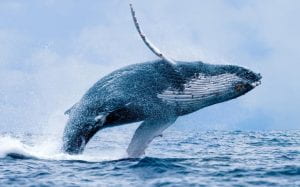Written by Sofia Avila, Edited by Skylar Griffin
Whale basics:
You’ve probably heard of blue whales, sperm whales, orcas etc, but did you know that whales are divided into two distinct categories. These categories are toothed and untoothed whales. Toothed whales are hunters, able to consume squid, seals and fish. Untoothed whales, also called baleen whales, strain their food through fringed plates that are useful for eating smaller food, such as krill. With the exception of orcas, whales are also very social creatures that travel in family units, and have the ability to self recognize, which is a sign of high intelligence. All in all, whales are extremely interesting animals that are loving and sweet tempered. If this is the case, why are there organizations calling for their protection?
Are whales threatened?
According to Save the Whales, an organization aimed at protecting oceans and all their inhabitants, whales face dangers that were outlawed years ago. Whaling, a practice where whales are hunted for their blubber, oil and meat, was banned in 1986 by the International Whaling Commission (IWC) when several species came close to becoming extinct. However, countries like Iceland, Norway and Japan are notorious for continuing their whaling practices, directly violating the IWC law. According to the Whale and Dolphin Conservation, approximately 1,500 whales are killed each year at Japan, Iceland and Norway’s hands alone. In addition to being hunted, whales face threats of habitat loss due to ocean pollution, loss of food sources, climate change, plastic ingestion and net entanglement. Whaling is not the only threat these creatures deal with.
Why are whales important to the oceans?
Whales are an essential part of the ocean ecosystem. One of their main jobs in the ocean is to regulate the food chain, which keeps certain creatures from overpopulating the ocean. For example, a blue whale can consume about 40 million krill each DAY, which just goes to show that without whales, there would be a disruption to the ocean’s food chain. Another reason why whales are important to the oceans is through something a little weirder…their poop actually helps pull carbon dioxide from the environment. By defecating, whales bring essential nutrients to the surface of the water, where phytoplankton grow, and phytoplankton form the foundation of the marine food chain. Phytoplankton also breathe in carbon dioxide from the outside atmosphere to help them grow their body structures, and when they are consumed, they take this carbon dioxide with them, ultimately eliminating it from the environment. It seems incredibly strange that whale poop ultimately helps save the environment, but several studies have been conducted that prove how beneficial it is.
Whales are such an essential part of the ocean’s ecosystem, as well as to our everyday environment. They are tender hearted creatures, and there are several ways to help protect them. If you are interested, here is a list of 40 different ways you can help save whales, with some fun ones being adopting a whale, and some other ones you can start at home, like reducing consumption of single use plastics and plastic bags. The fate of these creatures lie in your hands!

